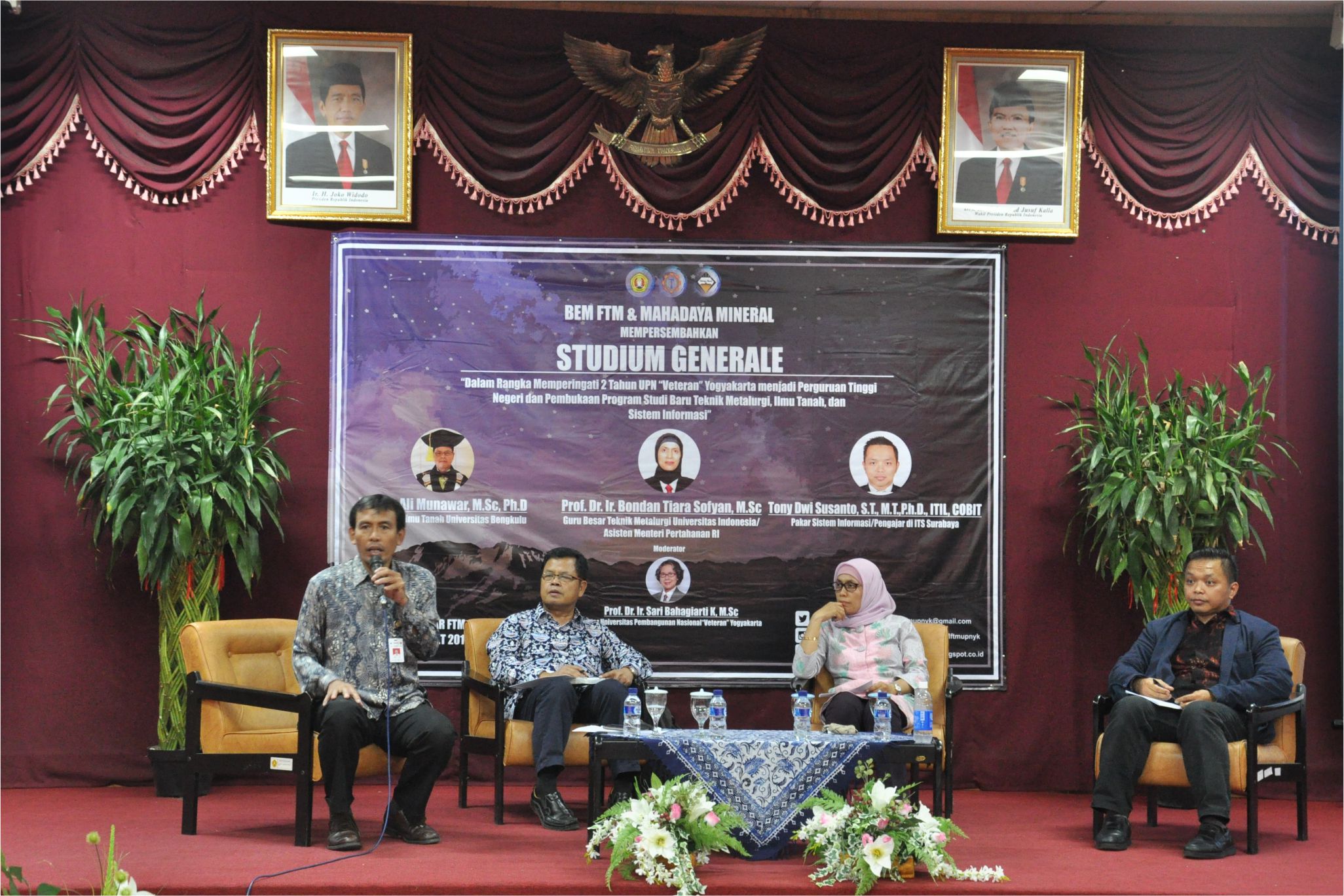On Friday, March 31st, 2017, form 08.30 until the completion of the occasion, UPNVY commemorated its second anniversary to become a state university and the launching of the three new study programs, metallurgy Engineering, Geology and Information System. Within the scope of this activity, Universitas Pembangunan Nasional “Veteran” Yogyakarta is committed to continuing the strengthening of its steps to participate in developing a nation having assets in the form of qualified Human Resources. This commitment is proven by holding discussions by experts, by inviting specialists of the relevant study programs as the key speakers.
The speakers attending the discussion were from 3 leading Indonesian universities. These key speakers are the experts and academicians mastering their respective scientific fields, an expert in Geology, Prof. Ir. Ali Munawar, M.Sc., Ph.D, the speaker from Bengkulu University (Universitas Bengkulu), an expert in Metallurgy Engineering, Prof. Dr. Ir. Bondan Tiara Sofyan, M.Sc, as the speaker from the Faculty of Metallurgy Engineering of Universitas Indonesia (University of Indonesia) who is also an Assistant of the Defense Minister of the Republic of Indonesia, and an expert in Information System, Toni Dwi Susanto, S.T. M.T. Ph.D, ITIL.,COBIT, as the key speaker from Surabaya Sepuluh November Institute of Technology (Institute Teknologi Sepuluh November Surabaya). The discussion was moderated by Dr. Ir. Joko Soesilo, MT. The program was attended by Prof. Dr. Ir. Sari Bahagiarti, K, MSc., the Rector of Universitas Pembangunan Nasional “Veteran” Yogyakarta who, on that occasion, opened the program and delivered her welcoming speech. This discussion was also attended by the Deputy Rector Commissioning Academic Affairs, Deputy Rector Commissioning General Affairs and Finance, Deputy Rector Commissioning Students’ Affairs and Cooperation, Dean of the Faculty of Mineral Technology, Dean of the Faculty of Agriculture and the students of Universitas Pembangunan Nasional “Veteran” Yogyakarta and students-to-be from a number of high schools in Yogyakarta.
Initiating the discussion, the first key speaker presenting the material, Prof. Ir. Ali Munawar, from Universitas Bengkulu, started the presentation by informing about curriculum vitae (personal data). The Geology expert was born in Sukoharjo on May 18th, 1959, went to the Faculty of Agriculture, Gajah Mada University (Universitas Gajah Mada), where he studied geology. He attended University of Kentucky, USA and studied geology for his S2 degree program and S3 (doctorate) program. He works as a lecturer for S1 degree program at the Faculty of Agriculture and for S2 (Post-graduate) Degree Program, teaching the management natural resources and environment at Universitas Bengkulu. He informed the land contour on the Earth’s surface is resulted by pedogenic processes. Soil possesses vertical and horizontal differentiations not existing in the hosting materials and soil is a self-regulating system. Types of soil include: Entisols, Inceptisols, Alfisols, Spodosols, Mollisols, Vertisols, Andisols, Histosols, Ultisols and Oxisols. Ultisols and Oxisols are primeval soils. Soil mainly functions as a recycling agent, water flow regulator, as the sphere for bio-organisms and their diversity, filter and supporter and also as the physical stability preserver and supporter.
In line with Mr. Ali, the second material presenter from University of Indonesia (Universitas Indonesia), an expert in Metallurgy Engineering, Prof. Dr. Ir. Bondan Tiara Sofyan, MSc., started his presentation by elucidating his curriculum vitae. Mrs. Bondan studied Metallurgy Engineering for her S1 degree and Material Sciences for her S2 degree at University of Indonesia and attended Monash University, Australia and studied Metallurgy engineering for her doctorate degree. This science has been in existence since megalithic era (6,000 years BC) and continued to be studied in the Iron Age (2,000 years BC), Industrial Revolution (1760), telephone light (1978) and up to the Computer Era (1942). Metals have changed human civilization. Metals, such as iron, Aluminum and others have been used for thousands of years, beginning in 2,000 years BC. Metals are the main components of buses, airplanes and even the Challenger spacecraft. Iron is the main element for the construction of the Thames Barrier, the Channel Tunnel, the Eiffel Tower and other man-made structures. Iron is the basic material we can find in our daily life, in razors (cutting blades), paper clips and so forth. The properties of Iron can be modified in accordance with the needs. Aluminum is a younger metal, and it started to be used only in 1800s. Aluminum is classified as a light metal. It is the main material for the construction of fuselage, vehicle engines, drink packages, building structure and, when amalgamated with other metals, can be cast and transformed, and its power can be strengthened by heat treatment and shaping. In addition, this Metallurgy Engineering expert, explained the processes of aluminum from the upstream to the downstream. Metallurgy Engineering is a scarce subject of study in Indonesia. Indonesia only has 6 universities opening Metallurgy Engineering. Indonesian universities opening Metallurgy include UI, ITB, ITS, UNTIDAR, UNJANI, and UPN “Veteran” Yogyakarta.
The third material presentation, in concord with the two previous ones, the speaker, who is an expert in Information System from ITS, also started his presentation with his curriculum vitae. Toni DwiSusanto, S.T, M.T., Ph.D., ITIL., COBIT, is an alumni from UPN “Veteran” Yogyakarta. Toni is not only a lecturer. He has also published of 5 books. Apart from that, Tony is also the Chapter President Association of Information System in Indonesia, a lecturer of information System and ChiefResearcher, IT management consultant, and a Specialist Member of the National Educational Standards (BSNP). This Information System expert explained thatInformation as an object means a number of components consisting of IT, people and organizations, who work together to process data into information.
Jl. SWK 104 (Lingkar Utara), Condongcatur, Yogyakarta 55283 (Kampus Pusat)
Jl. Babarsari 2 Yogyakarta 55281(Kampus Unit II) | Telp. +62 274 486733



